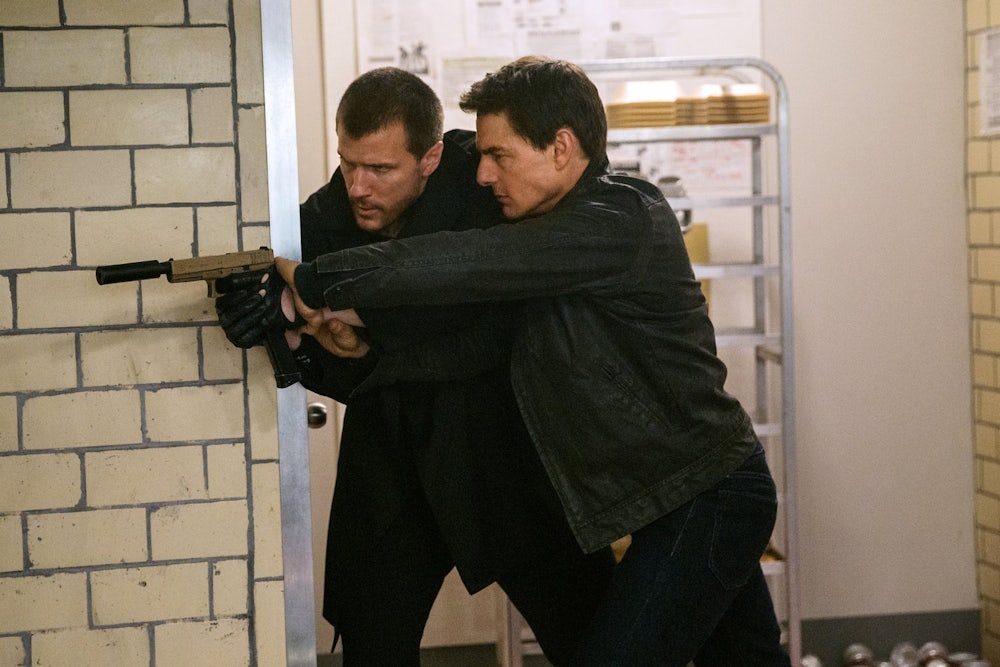Whatever your thoughts about Tom Cruise, it’s impossible to argue the guy doesn’t go for it. Cruise’s dogged persistence and legendary intensity—at one point in Jack Reacher: Never Go Back, a teenage girl tells him point blank “you’re very intense”—has led to his spot as one of longest-lasting movie stars in the world, despite his public embarrassments and eccentricities. Actors and crew famously love working with Cruise because he’s a hard-working professional who shows up on time and always gives it his all, for better and for worse. It’s patently ridiculous that Cruise—now 54 and older than Wilford Brimley in Cocoon— is still running around and getting in fights with his shirt off, but he throws himself into each role with such abandon, I can’t help but begrudgingly admire him. Good for you, Tom. I don’t know how you do it, or even why, but who am I to tell you to stop?
One of the more discouraging aspects of Jack Reacher: Never Go Back is how by-the-numbers it is. Cruise, who produced this and the previous Jack Reacher film, clearly sees something in the character, but I’ll confess I’m not quite sure what it is. Based on the novels by Lee Child—books better known more for their page-turner quality than their psychological depth, Jack Reacher has always struck me as Cruise’s second-tier Mission:Impossible franchise, the movies he picks up while he’s killing time. (Mission Impossible is another monument to Cruise’s persistence: It’s been going nearly twenty years, with directors as varied as Brian DePalma, John Woo, Brad Bird and J.J. Abrams but the constant, as always, is Cruise.) Cruise has kept his place atop the movie-star food chain by working with young, new directors who are eager to put their twist on the Cruse persona. But here, with an older, more sedate presence in Edward Zwick, the film has the empty sheen of a quick in-and-out cash grab, a movie insisting that it’s a franchise while the audience yawns indifferently. It’s disconcerting to see Cruise phoning it in.
Reacher—who at 6’5” is infamously a foot taller in the books than Cruise—is a former Army major who drifts around, settling scores, and defending the innocent and vulnerable. He’s a nonsense character, existing so Cruise can flex his still-got-it muscles, and weightless enough to build some airport novels around. On a visit to an active Major (Cobie Smulders) he stumbles onto a government conspiracy involving a Blackwater-esque paramilitary corporation and must help his new friend escape and solve the mystery of the shady executives Pulling All The Strings. Also, in an unnecessary subplot meant to humanize a character that isn’t particularly human in the first place, we meet a teenage girl (Danika Yarosh) who may or may not be Reacher’s daughter. She exists mostly to be captured so that Reacher can save her.
This is all surprisingly rote and lifeless. Remember the extended supercut of Tom Cruise running in all of his movies? I’ve always been wary of such jokey Internet bits. By taking scenes out of context, they minimize the kinetic energy Cruise can bring to his best roles—he’s going somewhere when he’s running. But much of Jack Reacher feels like one of those videos, in which things are happening for little reason and to little effect. The whole gang is all here this time, the plucky love interest, the global conspiracy, the sneering bad guy whose killing ability is established just so that we can appreciate Tom Cruise’s strength when he ultimately defeats him. That’s what I mean about the second-tier Mission: Impossible feel of this whole enterprise: The Jack Reacher films feel cheaper, less thought-out, and less compelled to justify their existence.
There was a time, quite a while ago, that Cruise felt this need to show us he was a Serious Actor. He didn’t necessarily need to do this—Rain Man and Jerry Maguire were picture perfect examples of how to execute a leading man arc—but there he was, trying to be seductive in Interview with the Vampire, emote madly in Magnolia, and hang on in Eyes Wide Shut. But for the last 15 years, Cruise has been clinging onto whatever youth he has left, playing the action hero in so many franchises it’s difficult to keep track. Sometimes this works splendidly, like in Edge of Tomorrow and Mission: Impossible—Ghost Protocol. But when the script isn’t there, as it wasn’t in Oblivion or Knight & Day, these movies start to feel like what Cruise’s skeptics believe they are: vanity projects. It’s impossible not to respect Cruise’s drive all these years, but sometimes it’s not the best to indulge it.
Grade: C
Grierson & Leitch write about the movies regularly for the New Republic and host a podcast on film. Follow them on Twitter @griersonleitch or visit their site griersonleitch.com.
